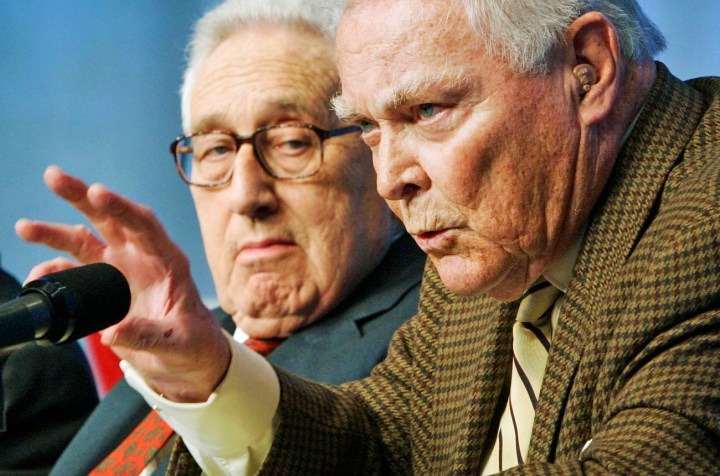Politics
Alexander Haig, man who would be US president, dies aged 85

Alexander Haig, career army officer, chief of staff in the White House for Richard Nixon and secretary of state for Ronald Reagan, passed away over the weekend at the age of 85.
In his rich career, Haig became a four-star general without ever leading an army into battle, saved the sanity of the US presidency in the dying moments of the Nixon crisis and commanded all of Nato’s troops. But he will always be remembered as the guy who badly, desperately wanted to be president of the USA.
When Ronald Reagan was shot on 30 March 1981, Haig was his secretary of state. As soon as he learned of the assassination attempt, Haig rushed to the White House, hurtled into the press room, and shaking and sweating after his run, announced on live television that, pending the arrival of then-vice president George Bush, he, Alexander Haig, was in charge. He was commander in chief. He was the man in the White House.
Well-worth watching: ABC Nightline report Reagan Assassination attempt, 30 March 1981
However, Haig had somehow managed to overlook a thing called the US Constitution. Yes, he was in the line of succession to the presidency, but only fourth in line (as it were). First was the vice president, then the speaker of the House of Representatives (then Tip O’Neil), followed by the president pro tempore of the Senate (at that time, white segregationist Strom Thurmond), and only then came the secretary of state. I guess you can imagine that that little, how shall we say, incident, turned out to be a career-limiting move for Haig. For years after his miscue Haig would say that those 10 minutes of his life, played out live on television around the world, would be the subject of the third paragraph of his obituary. Funny that.

Photo: The ten minutes he would be regretting for the rest of his life: Alexander Haig speaks to the press about President Ronald Reagan’s condition after being shot on March 30, 1981. He said: “Constitutionally, gentlemen, you have the president, the vice president and the secretary of state, in that order, and should the president decide he wants to transfer the helm to the vice president, he will do so. As of now, I am in control here, in the White House, pending the return of the vice president and in close touch with him. If something came up, I would check with him, of course.”
After growing up in the Philadelphia suburbs, Haig entered West Point in the middle of World War II. Once in the army, he quickly became the pre-eminent example of a new breed of American powerbroker – the political general. His early assignments included service on the staff of one of General Douglas MacArthur’s deputies – both when MacArthur was the American proconsul in the occupation of a defeated Japan and then again when MacArthur became UN commander during the Korean conflict.
Haig showed his political bent early on, marrying the daughter of a commanding general and later hitching his wagon to Henry Kissinger’s bright star when the latter became Richard Nixon’s national security advisor. By the time the Nixon administration was foundering in the Watergate scandal, Alexander Haig had become White House chief of staff and with it, accomplished the amazing feat of promotion (by two ranks to four-star general) over more than 200 other flag-rank officers. Haig managed this despite only a very modest stint of combat experience as a regimental commander during a tour of duty in Vietnam. Some accounts say that, as Richard Nixon slid into serious drinking and dire thoughts of retribution against those trying to bring him down, Haig was the one who actually ran the White House, working overtime to keep the presidency – if not necessarily the president – on an even keel.
In appointing Haig as secretary of state, Ronald Reagan heeded Richard Nixon’s recommendation, but Haig turned out to be a spectacular failure. His cabinet colleagues found him overbearing, bombastic (he had early on declared himself “the vicar of foreign policy”), caustic and argumentative. Reagan’s (and thereby Haig’s) foreign policy became embroiled in the Iran-Contra illegal arms deal, and Haig was increasingly walled off from the president by the White House triumvirate of senior advisors Ed Meese, James Baker III and Michael Deaver.
When, 18 months into his tenure, Haig finally resigned, Ronald Reagan accepted and thanked him in a short, almost pro forma letter. Reagan appointed George Schultz, who brought badly needed stability to the state department and remained in the job until 1989.
Haig’s highly visible presidential ambitions would ultimately remain unrequited after he shut down his brief experiment to seek the Republican nomination in 1988. It was clear there was little support for him.
Haig moved to the business world after that, serving as a corporate advisor and board member for defence contractors and high-technology corporations. In his autumnal years he didn’t end up a poor man, shall we say.
But whatever he did and whatever he said, he remained the guy who really, badly wanted to be the boss in the Oval Office.
By J. Brooks Spector
For more, read the New York Times, the AP, the State Department website.
Main photo: Alexander Haig speaks as Henry Kissinger (L), former U.S. Secretary of State from 1973-1977 under Presidents Nixon and Ford, looks on during the “Vietnam and the Presidency” conference at the John F. Kennedy Library in Boston, Massachusetts, in this file photo taken on March 11, 2006. Haig, a former Army general who became White House chief of staff during the Watergate scandal and was secretary of state during the Reagan administration, died on February 20, 2010 at the age of 85. REUTERS/Brian Snyder





 Become an Insider
Become an Insider